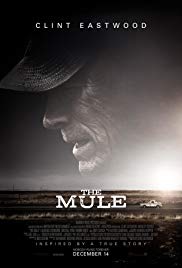The Mule
The Mule
Starring Clint Eastwood, Bradley Cooper, Dianne Wiest, Michael Pena
Directed by Clint Eastwood
The Story:
Earl Stone (Clint Eastwood) is a Korean War vet who works as a horticulturist, a man who spent decades taking care of flowers while neglecting his wife Mary (Dianne Wiest) and daughter Iris (Alison Eastwood). Twelve years after no-showing at his daughter's wedding, his flower company is bankrupt, his house is foreclosed, and he's essentially homeless. He goes to his granddaughter Ginny's (Taissa Farmiga) engagement party, and a man there offers him a seemingly simple job - just drive. He begins driving packages for a drug cartel back and forth, and as he maintains his job, he draws the appreciation of drug lord Laton (Andy Garcia).
Earl is making more and more money, and using it to buy a new car, re-purchase his house, and help out other people in need. Meanwhile, DEA Agent Colin Bates (Bradley Cooper) is trying to bring down the cartel, along with his partner Trevino (Michael Pena). He gains a mole on the inside who mentions a drug mule that's making waves in the community, and they set out to find this mule and stop the drug trade in Illinois.
The Synopsis:
More often than not, films start off with a tremendous beginning and slowly putter out throughout until we can't wait for it to end. "The Mule" managed to flip the script on that for me - it started off very rough and boring, but as the film progressed, it got essentially better. What started off as a generic, by-the-books drama escalated into a full-on tense production, led by one of the greatest film actors of all time, delivering some solid performances and memorable moments that solidified it as something better than the sum of its parts.
It seemed that the film was spiraling down to a generic stereotypical characterization. The ever-great Clint Eastwood plays Earl Stone, an elderly man who's hired by a drug cartel to serve as their mule (a driver who delivers drugs in exchange for money), and he plays to the typical stereotypes of old people - they don't understand technology, they hold to working more than being with their families, they have no filter when it comes to their talk, and so on. Yet as the film progressed, we learn the reasoning why Eastwood delivered such a generic performance - it suited his character the best. When the DEA was searching for the drug mule, they relied on tried-and-true racial profiling to find their man, and when they see an elderly white man driving by, they let him go because there's no possible way a man like that would work with a Mexican drug cartel.
Stereotypes exist throughout the film to prove this kind of diatribe. Earl wasn't there for his family, and they do the traditional distancing when he tries to be a part of their lives (seriously, they were super annoying as to how they were avoiding him, especially his daughter - played by Eastwood's real-life daughter Alison - who literally moved down seats to avoid sitting next to him). Yet this was only the buildup to a pleasantly surprising climax of resolution, where we witness true greatness in a truly moving scene between Eastwood and Dianne Wiest, who plays his wife.
The Mexicans here are seen as nothing more than drug dealers who want to bring harm to everyone and become filthy rich with huge mansions and a conga line of prostitutes. This view actually never really changes throughout, and is interesting to see how they're portrayed especially in the times we live in today. Equally, the DEA serve as an almost bumbling group of people who use their internal racism to find the mule, which of course turns into a fruitless endeavor. But yet, even here, we see results of greatness. There's another epic scene where Eastwood's Earl and Bradley Cooper's Bates meet at a Waffle House and have a discussion about life, and you're drawn to both actors in such a deeply profound way. So again, it's forgivable for the slow start to garner such terrific moments - like a flower slowly blooming, to compare to Earl's earlier job.
The Summary:
While it's not one of Eastwood's best, it's still filled with some great performances and tense moments as the stakes are raised with each delivery, culminating in a few subtly powerful moments by some of cinema's most outstanding performers.
The Score: A




Comments
Post a Comment